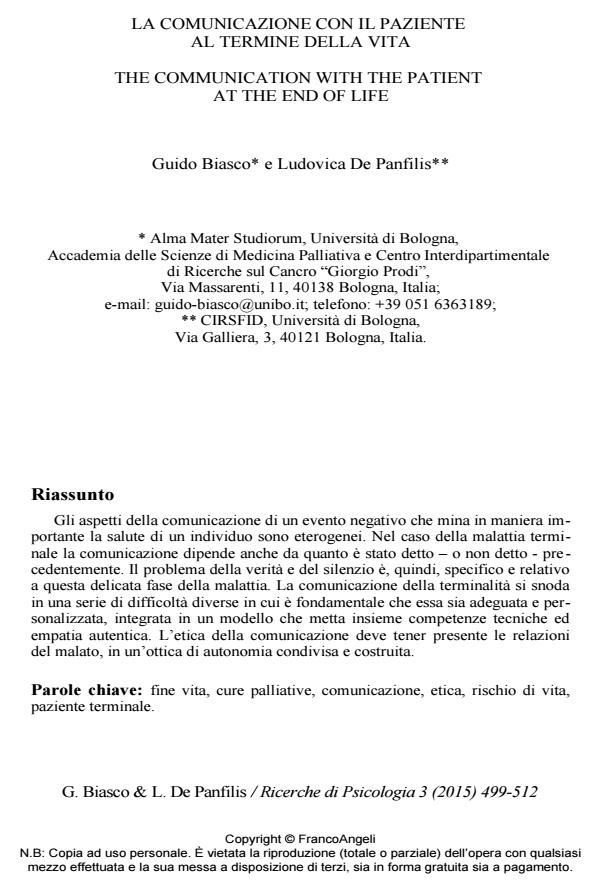The communication with the patient at the end of life
Journal title RICERCHE DI PSICOLOGIA
Author/s Guido Biasco, Ludovica De Panfilis
Publishing Year 2015 Issue 2015/3 Language Italian
Pages 14 P. 499-512 File size 166 KB
DOI 10.3280/RIP2015-003004
DOI is like a bar code for intellectual property: to have more infomation
click here
Below, you can see the article first page
If you want to buy this article in PDF format, you can do it, following the instructions to buy download credits

FrancoAngeli is member of Publishers International Linking Association, Inc (PILA), a not-for-profit association which run the CrossRef service enabling links to and from online scholarly content.
A negative event that seriously undermines the health of an individual can be approached in different ways. In the presence of a terminal illness, communication depends also what was said - or not said - earlier. The problem of truth or silence seems to be important for this delicate stage of the life. The communication of the terminal illness runs in a number of different problems that need to be integrated into a single model that would bring together the clinical skills and genuine empathy. The ethics of communication must take into account the relationship with the patient, in a perspective of shared autonomy.
Keywords: End of life, palliative care, communication, ethics, life threatening, terminal patient.
- Ashcroft, R.E. (2000). Teaching for patient-centred ethics. Medicine, Health and Philosophy, 3, 287-295.
- (The) Barcelona Declaration on Policy Proposals to the European Commission on Basic Ethical Principles in Bioethics and Biolaw (adopted in November 1998 by Partners in the BIOMED II Project). Beauchamp, T.L., & Childress, J.F. (1999). Principi di Etica Biomedica. Firenze: Le Lettere.
- Biasco, G. (2013). Comunicare e curare. Bologna: ASMEPA Edizioni.
- Biasco, G, Moroni, M., & De Panfilis, L. (2012) Communication with cancer patients about palliative and end-of-life care. In A. Surbone et al (Eds). New challenges in communication with cancer patients (pp. 191-205). New York: Springer.
- Biasco, G., & Surbone, A. (2009). Cultural challenges in caring for our patients in advanced stages of cancer. Journal of Clinical Oncology, 27, 157-158. DOI: 10.1200/JCO.2008.19.9455
- Blackhall, L.J. (2013). Do patients need to know they are terminally ill? No. British Medical Journal,, 346: f2560.
- Botti, C. (2012). Prospettive Femministe. Morale, bioetica e vita quotidiana. Torino: Espress Edizioni. Buckman, R. (2001). Communication skills in palliative care: a practical guide. Neurologic Clinics, 19, 989-1004.
- Campanello, L., & Sala, G. (2008). La dimensione spirituale e religiosa alla fine della vita. In M. Costantini, C. Borreani & S. Grubich (Eds.). Migliorare la qualita delle cure di fine vita (pp. 111-128). Trento: Erickson Edizioni.
- Collins J. (1927). Should doctors tell the truth? Harper’s Magazine, 155, 320-326.
- Collis E., & Sleeman, K.E. (2013). Do patients need to know they are terminally ill? Yes. British Medical Journal, 346, f2589.
- Deschepper, R., Bernheim, J.L., Vander Stichele, R., Van den Block, L., Michiels, E., Van DerKelen, G., Mortier, F., & Deliens, L. (2008). Truth-telling at the end of life: a pilot study on the perspective of patients and professional caregivers. Patient Education and Counselling, 71, 52-56. DOI: 10.1016/j.pec.2007.11.015
- Funghi, P. (2009). Curare e prendersi cura. Temi di bioetica e di biodiritto. Milano: FrancoAngeli.
- Kon, A.A .(2010). The shared-decision making continuum, JAMA, 304, 903-904. DOI: 10.1001/jama.2010.1208
- Liu, P.H., Landrum, M.B., Weeks, J.C., Huskamp, H.A., Kahn, K.L., He, Y., Mack, J.W., & Keating, N.L. (2014). Physicians’ propensity to discuss prognosis is associate with patients’awareness of prognosis for Metastatic Cancers. Journal of Palliative Medicine, 17, 673-82. DOI: 10.1089/jpm.2013.0460
- Marzano, M. (2004). Scene finali. Morire di cancro in Italia. Bologna: il Mulino.
- Mauri, E., Vegni, E., Lozza, E., Parker, P.A., & Moja, E.A. (2009). An exploratory study on the Italian patients regarding how they would like to be told about their cancer. Supportive Care in Cancer, 17, 1523-1530. DOI: 10.1007/s00520-009-0621-7
- Nave, L., Pontremoli, P.E., & Zamarchi, E. (2013). Dizionario di counseling filosofico e delle pratiche filosofiche. Milano: Mimesis.
- Parker, P.A., Baile, W.F., de Moor, C., Lenzi, R., Kudelka, A.P., & Cohen, L. (2001). Breaking bad news about cancer: patients’ preferences for communication. Journal of Clinical Oncology, 19, 2049-2056.
- Quill, E., & Abernethy, A.P. (2013). Generalist plus specialist palliative care--creating a more sustainable model. New England Journal of Medicine, 368, 1173-1175. DOI: 10.1056/NEJMp1215620
- Roeland, E., Cain, J., Onderdonk, C., Kerr, K., Mitchell, W., & Thornberry, K. (2014). When open-ended questions don’t work: The role of palliative paternalism in difficult medical decisions. Journal of Palliative Medicine, 17, 415-420. DOI: 10.1089/jpm.2013.0408
- Rumbold, B. (1998). Implications of mainstreaming hospice into palliative care services. In J. Parker & S. Aranda (Eds.) Palliative care: explorations and challenges (pp. 24-34). Sydney: MacLennan & Petty.
- Slote, M. (2007). The Ethics of Care and Empathy. London: Routledge. de Vries, K. (2001). Enhancing creativity to improve palliative care: the role of an experiential self-care workshop. International Journal of Palliative Nursing, 7, 505-511.
Guido Biasco, Ludovica De Panfilis, La comunicazione con il paziente al termine della vita in "RICERCHE DI PSICOLOGIA " 3/2015, pp 499-512, DOI: 10.3280/RIP2015-003004